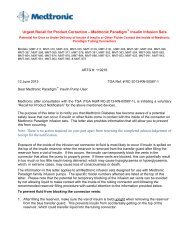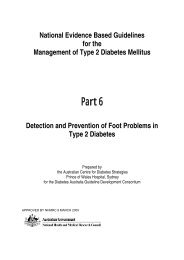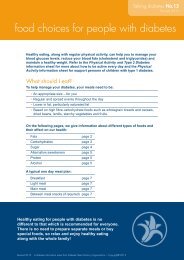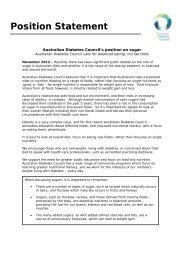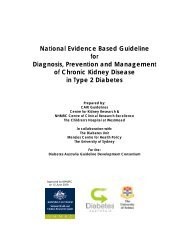Tamil - Australian Diabetes Council
Tamil - Australian Diabetes Council
Tamil - Australian Diabetes Council
- No tags were found...
Create successful ePaper yourself
Turn your PDF publications into a flip-book with our unique Google optimized e-Paper software.
17<br />
<strong>Diabetes</strong> and your Feet<br />
<strong>Diabetes</strong> may affect the feet in two ways.<br />
Firstly, nerves which allow you to feel pain, temperature and give an early warning of possible<br />
injury, can be damaged.<br />
Secondly, the blood supply to the feet can be reduced due to blockage of the blood vessels.<br />
Damage to the nerves and blood vessels is more likely if you have had diabetes for a long<br />
time, or if your blood glucose (sugar) levels have been too high for too long.<br />
It is recommended that people with diabetes should be assessed by a podiatrist or doctor at<br />
least every six months. They will advise a common sense, daily care routine to reduce the risk<br />
of injuries and complications.<br />
It is also essential to check your feet every day for any problems.<br />
Caring for your feet<br />
• Maintain blood glucose levels within the range advised by your doctor<br />
• Help the circulation to your feet with some physical activity like walking<br />
• Know your feet well<br />
– Look at your feet daily. Use a mirror if you need to. Check between your toes<br />
– Wash your feet daily in warm (not hot) water, using a mild soap. Dry gently and thoroughly<br />
– Never soak your feet<br />
– Use a moisturiser to avoid dry skin<br />
– Only cut your toenails if you can do so safely. Cut straight across – not into the corners –<br />
and gently file away any sharp edges.<br />
• Choose footwear which is appropriate for your activity. Smooth out wrinkles in socks<br />
• Check your shoes regularly for excess wear on the outside and for any rough spots on the<br />
inner lining<br />
• Avoid foot injuries by wearing shoes or slippers around the house and footwear at the<br />
beach or pool<br />
• Avoid contact with very hot or cold items, such as hot water bottles, heaters, electric<br />
blankets, hot sand/pathways and hot bath water<br />
• Wear insulated boots to keep feet warm on cold days<br />
• Corn cures and medicated pads can burn the skin. Do NOT treat corns yourself - see your<br />
podiatrist<br />
• Get medical advice early if you notice any change or problems with your feet.<br />
82






